In less than a year, UK-based vloggers Ben and Emily have, impressively, succeeded in carving out a distinct niche for themselves on YouTube. Their weekly vlogs describe life on their 56-foot narrowboat Roísín Dubh (Irish for ‘black rose’) and illuminate the very particular beauty and charm of Britain’s canals and waterways. More than that, however, their channel offers a fresh perspective on alternative tiny living, as well as insight into nurturing and pursuing one’s creativity while deliberately enjoying life at a slower pace.
First of all, what inspired you both to consider living on a narrowboat?
[Ben and Emily] We moved to a town called Todmorden in Yorkshire, which has a canal running through it, and realised we liked the idea of narrow boating as our way of living. Seeing the smoke rising from chimneys, and the idea of having a free-moving home – off-grid and without debt – sparked our imagination.
Did either of you have any prior experience with narrow boating or exposure to boating and the canal system?
Not really. I had stayed on a boat for a week once, and for Emily the first time she got inside one was when we were looking to buy! Safe to say she fell in love straight away.
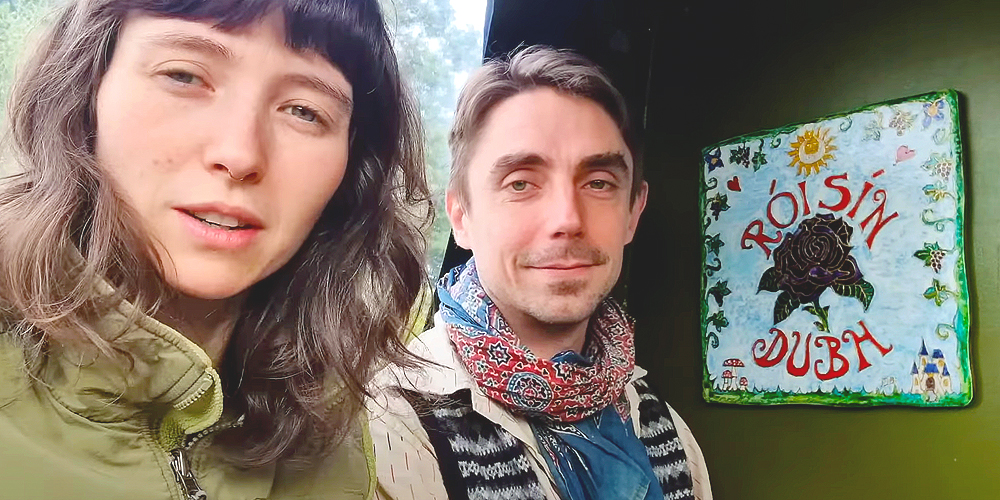
Alongside your boat, you also travel in your camper van. Did you always have an interest in tiny living, or alternative living in general?
Soon after we met, we lived in a camper van for six months and travelled to Spain and back, so we were used to small spaces as a couple. Emily has been raised in converted buses, her father choosing that way of life himself, and I have always been open to alternative ways of living, having lived in a converted shipping-container-type tiny home in a forest.
Do either of you have a feeling yet as to whether the narrowboat life is just an interesting experience for your current phase in life, or do you feel already that your lives might always be connected to the canals?
Getting involved in the canals has opened our minds to a completely different world and culture. It has tested us in many ways, and introduced us to a lot of lovely people and interesting characters. It’s probably too soon to say if we will always do this – it is enough for us now to enjoy this experience, as we have only explored a fraction of the canal system.
We love living this way of life, and at the moment, we can’t see why we would change anything for a very long time.
Do you both feel part of a narrow boating community, united by that shared experience, or are narrowboaters as varied as people in any other walk of life?
There are many types of people who boat, but the nature of it means that people are often likely to interact and help each other, which does create a sense of community. There are themes that I have found tie many boaters together, which include escaping the rat race, slowing the pace of life and connecting with nature.
What are the typical reactions of people when they discover you live on a narrowboat?
People are most often very curious and interested in the idea, although some don’t understand how it is possible to live on one, or how to stay warm. It’s surprising how many people have a connection to the canal, whether they have been on a boat, have a relative who owns one, or are generally fascinated by the idea.
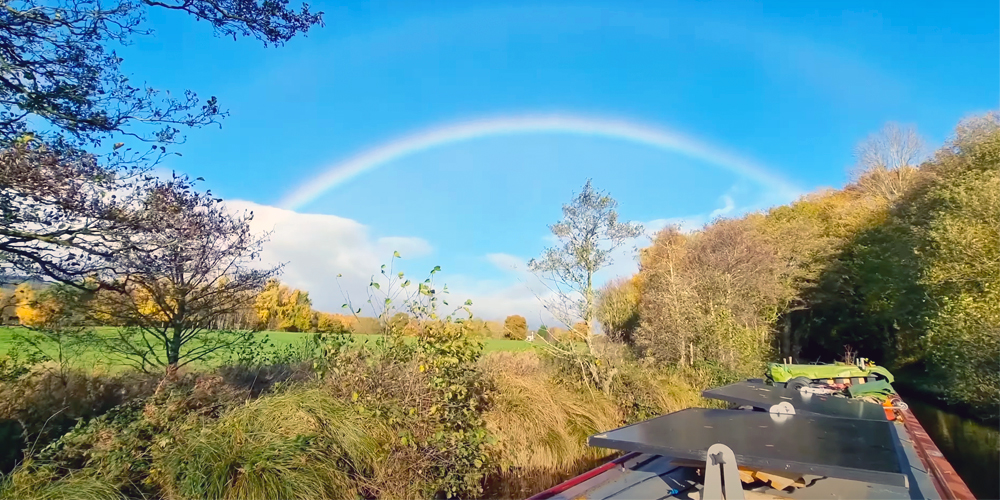
How do you think the perception of narrow boating has changed over recent years?
I have only been involved in narrow boating for two years, so I perhaps don’t have the most knowledge of this, but it seems like it’s becoming more of an option for a younger generation. They are considering it as an alternative to getting a mortgage, as there’s less debt involved, especially as buying a house becomes more expensive. Wanting to live off-grid is rising in general, but the barriers to doing this are massive, as there are only very limited ways for people to do this.
That’s an important issue, and many reports suggest that it is increasingly challenging for young people to get on the property ladder. Do you feel that this reality, and the current cost of living crisis, is driving more interest in alternative living options like narrowboats?
Definitely, as I mentioned, this way of life gives a more affordable option to own a home, without the debt and stress a mortgage implies. It isn’t as straightforward as owning a house or flat, however, as there can be more hidden costs from unexpected maintenance, and keeping the value of the boat up requires a lot of the same, so there is a risk there.
But, yes, I would say the cost of heating and fuel is way lower than a house, as you cut out corporate energy providers who profit at the expense of society. There is more empowerment in this mode of living. Though we buy gas and coal, we generate our own electricity and forage wood when it is possible to do so.
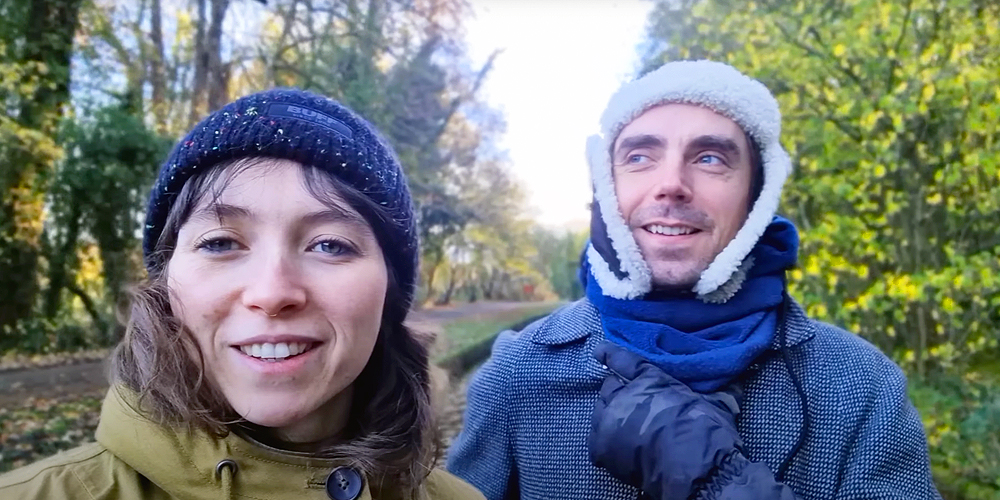
As you touched on, most narrowboats require continual maintenance and repairs. How difficult is that to deal with? Can it be stressful or frustrating?
Yes, you have to be hands-on with a boat as problems inevitably crop up. Luckily, we are both familiar with tools so we have adapted well, and we have learned a lot about boat engines! And it isn’t too difficult to get advice and tips from other boaters. Also, leaks and rust are a way bigger issue than I ever considered.
What do you both like most about narrowboat life and what do you both like least?
The best thing is the sense of freedom to live in different places, of finding a quiet place to listen to the sounds of nature and forget about the worries of the world for a while. We love the people we meet, and the chance to explore our country in a unique way.
Our least favourite thing is probably worrying that we are going to sink.
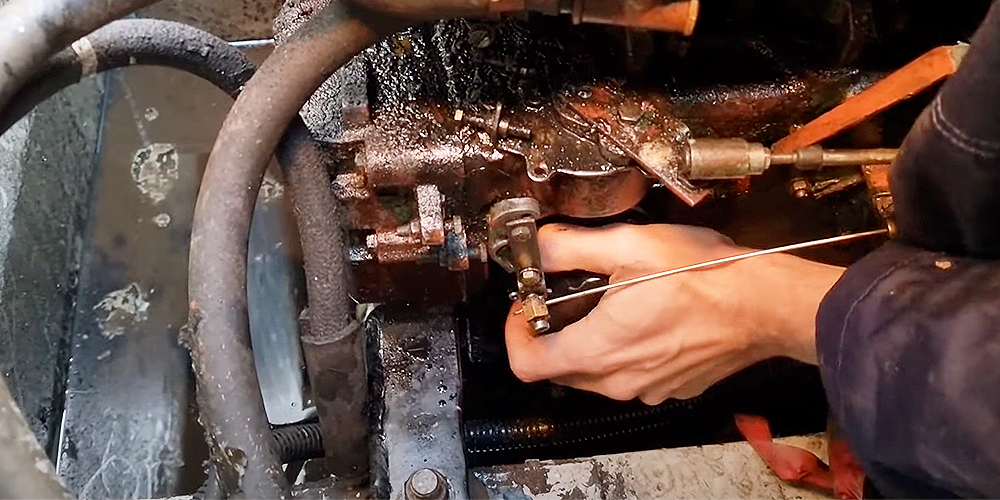
Living on the water and having the freedom to travel from place to place seems like such a romantic lifestyle to outsiders. But how does that image compare to the reality? Is it like a swan – serene on the surface, but a lot of continual paddling underneath the surface to stay afloat?
It isn’t as romantic as it is made out to be, by any means, but the hard work brought about through harsh weather, maintenance and unexpected knocks and plunges into the canal, gives us a sense of achievement and adventure. It is testing physically and mentally, you have to manoeuvre the boat with ropes when mooring up, operate heavy lock gates, lift coal bags. And also you are living in a small space, not always close to the amenities of society.
On your narrowboat you’re probably cruising along at just two or three miles per hour much of the time. Has that sense of ‘slow travel’ or ‘slow living’ changed you in any way? You both seem exceptionally chilled out anyway, but does that slow lifestyle leave a mark on people, and help them feel calmer?
It has helped us to become more patient, to accept that you must sometimes wait for things to come around. This is a concept we are leaving behind in the modern world, so I feel grateful to have a chance to slow down.
We do however still run a business – our YouTube channel – create music and continuously cruise, so we are busy! We do get stressed, but it’s great to be able to go for a walk, see the trees, take a deep breath and calm ourselves down again.
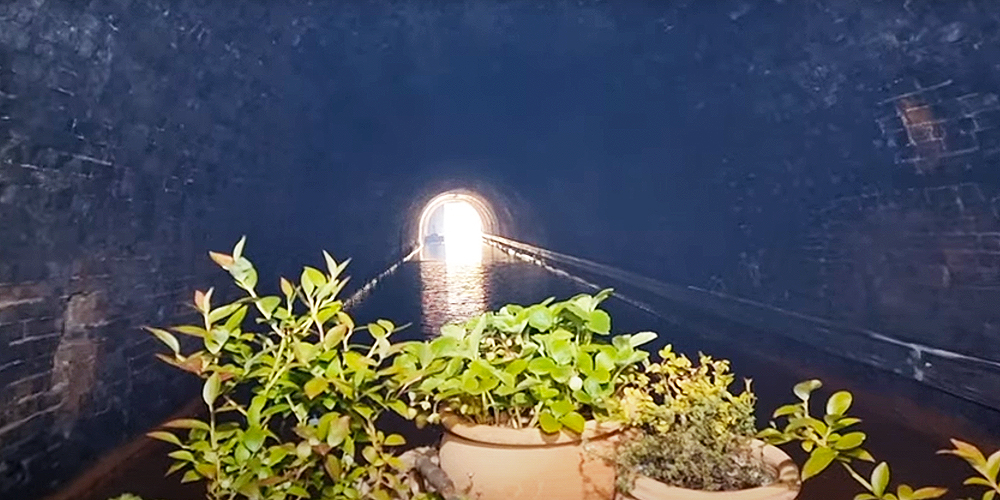
Was it always part of your plan to create a YouTube channel and to document your narrowboat experience online?
No it wasn’t!
We boated for a year on some of the most challenging canals – the Rochdale Canal and the Huddersfield Narrow Canal – and travelled through the three-mile-long Standedge Tunnels. Once it got easier, we decided to film cruising with music accompanying it, but lots of people reacted positively and it grew to what it is now.
Do fellow narrowboaters recognise you both and comment on your channel?
We do get recognised every now and again, we have made a lot of friends this way! It is, overall, a very friendly community, and we are grateful to be part of it.
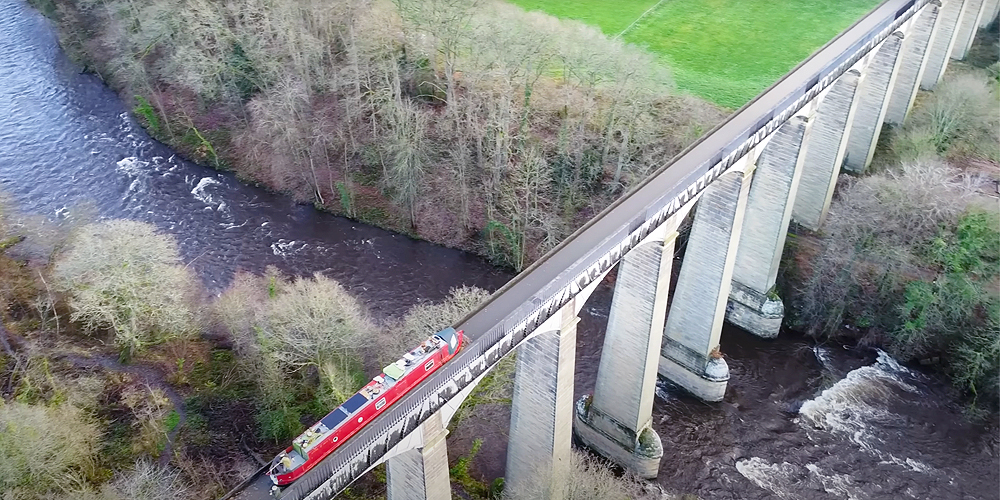
Your channel has a very approachable, naturalistic style, but is also extremely well shot and edited. Did you already have those technical skills or did you pick them up as you went along?
Emily did a degree in photography, but had never edited a video before. She tried it and loved the process, picking it up really fast. She has an artistic eye for shots, and I am improving my filming skills all the time.
There are plenty of YouTube narrowboat channels that look slick and polished, but often in quite a contrived way, presenting an idealised image, and with instalments that often feel too scripted. How do you avoid that and keep things so natural? Was it a deliberate decision to keep things as authentic as possible?
We rarely script anything, we sometimes film at random moments, and are generally a bit impulsive! We have used some techniques to give our episodes character, such as using a drone for spectacular aerial shots, but mostly we try to keep it natural.
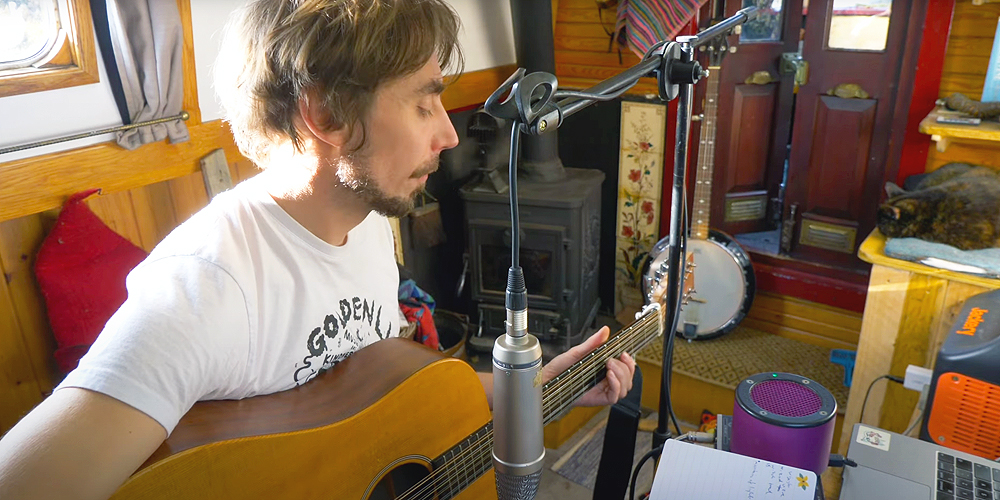
One feature that elevates the channel even higher is the combination of beautiful photography with wonderfully atmospheric original music. As a singer, songwriter and musician, Ben, was it a natural step to write music inspired by your boating life? Do you write music to suit the channel or simply write songs as an expression of your life on the water?
Originally, I wrote short pieces of music for the channel, then in one episode we tried putting in one of my unreleased songs, which was awaiting release on an independent label. The effect the song had on the atmosphere of the episode, and the reaction from viewers, meant that we started introducing more tracks, some being totally new unreleased material that I had recorded on the boat.
Being in this environment has affected my writing – it’s generally quieter and more peaceful than when I lived in a town, but also the limitation of space, and the limited amount of electricity at my disposal, meant that I took a more acoustic sound with only a few instruments. The effects of this were surprisingly positive, and resulted in me having a full album of tracks that I released under the name Benny Jones. I released this album totally independently of a label, and the results were great.
Currently, I am recording again with some tracks only for the narrowboat channel, and others I plan on releasing independently.
Ben, you mentioned your music released as Benny Jones, but you have also created albums under the name Bingo Harry, how does that work in practice? How do you separate your musical output between those two identities?
Bingo Harry has its own sound. It’s a project I have operated under the name of for several years. I guess it could be pigeonholed as psychedelic pop rock. I recently released a record under the name Benny Jones, just because its ethereal folk sound felt like it suited that name more. I also had a band with Bingo Harry, which recently went separate ways, so Benny Jones was a chance for me to do something totally fresh.
How does your musical career combine with your narrowboat lifestyle? Do they compete or does one part of your life feed into the other?
Being on the boat has provided a lot of creative inspiration. However, practically it has challenges, as I mentioned. The challenge is to use the limitations to your advantage. Also, moving around makes it difficult to put a band together and to collaborate with other musicians, so at the moment I am going solo, and have a few gigs on our route.
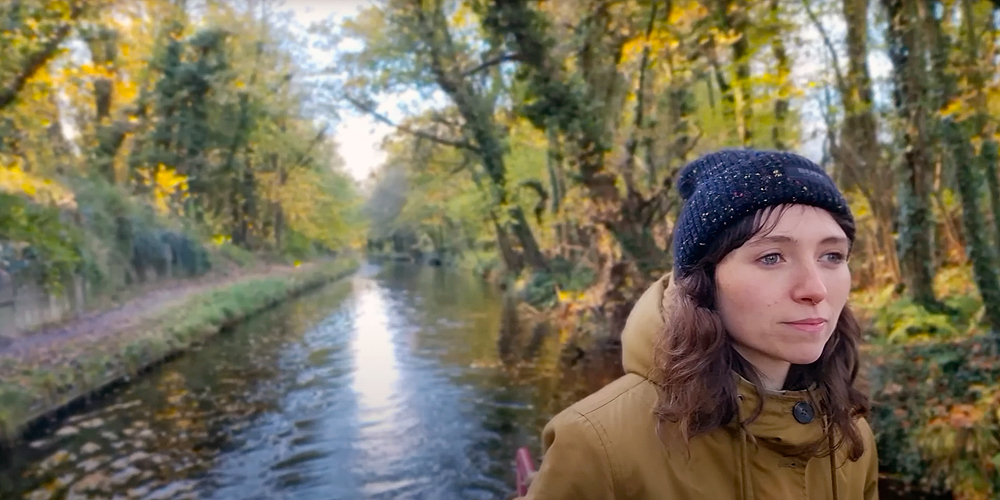
Emily, you also have a very successful Etsy channel. How do you juggle that with your narrowboat lifestyle?
Limits on space make storing supplies more difficult, and getting packaging supplies delivered is more complicated. But being able to operate on the move is invaluable when it comes to our mobile lifestyle. All we need is a post office to send out the packaged orders, and we are all good!
A lot of YouTube channels created by couples are dependent on portraying an idealised image of that relationship, but you both seem to have a more natural dynamic with a lot of humour and gentle sparring. How do you think the challenges of living on a narrowboat – and running a YouTube channel – impact a relationship?
We live in a small space which is essentially one long room! This is a challenge, as I’m sure it would be for any couple, and, yes, we do have our moments! But hopefully people still get an idea of our dynamic, that we are both understanding and figure out problems as they arise.
We knew YouTube would take time editing, but we had a lot of free evenings and thought it would be a constructive way to spend that time. Sometimes I might not be in the mood to film, but mostly we work out a way of doing it that we are both happy with.
The positives outweigh the negatives for us.
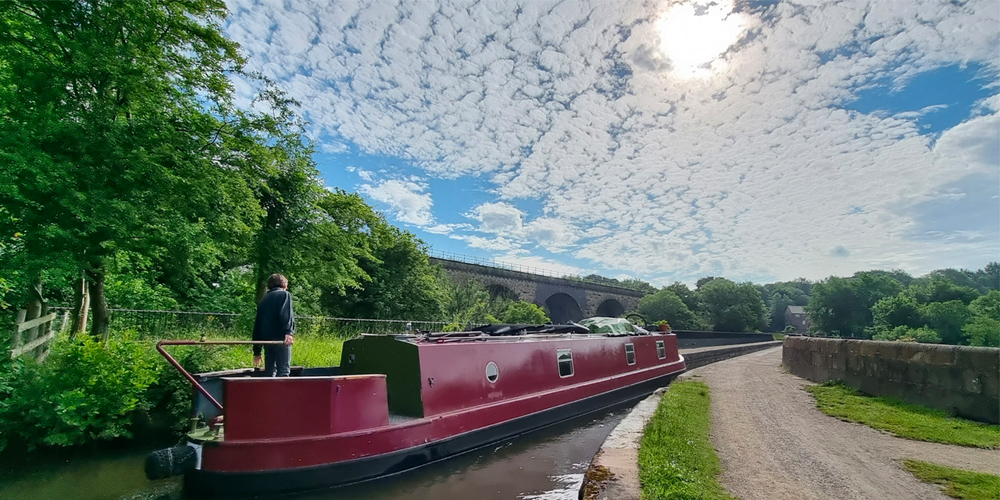
You are already approaching two million YouTube views after nine months and less than 50 videos, so how do you envisage developing your narrowboat channel further? Have you also imagined extending your channel, for example, with a book or maybe even a TV show on narrowboat life?
Our plan is to do what we do best, keep it natural, keep exploring, don’t push it too hard. Perhaps we will have moments of inspiration that will result in new ideas, but our plan is to keep travelling and documenting it.
We’ve just put out some merch which makes it all feel more official! People have shown interest in us doing a cookbook, but that will be a slow brewer as we are so busy with what’s already on our plate!
Do you have a life plan for the next few years, or do you simply enjoy living day to day?
We have toyed with the idea of getting a bigger boat, or some land in the coming years, maybe even relocating to a part of the country that we love if we discover such a place, but otherwise, yes, we are taking life as it comes.
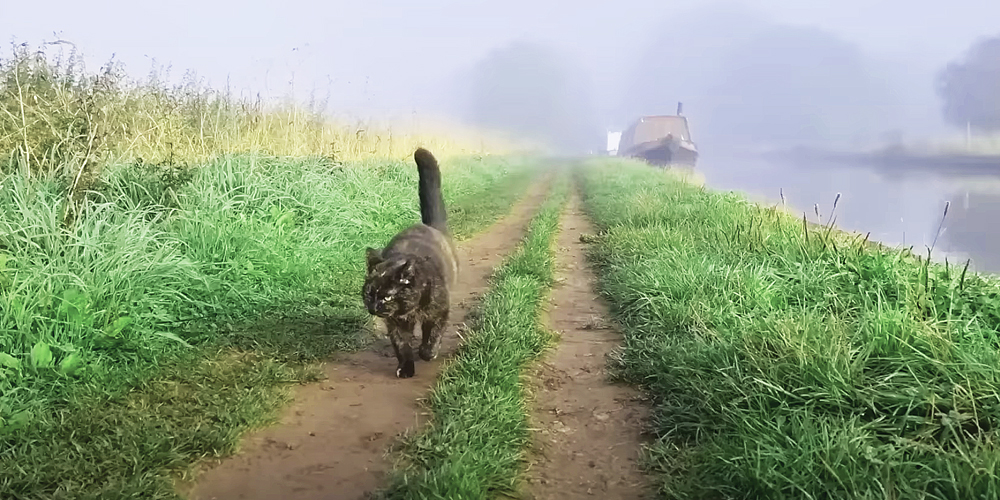
Finally, regular followers of your channel would be upset if we didn’t mention your furry friend Alan – a cat of deep thoughts, but few words. How long do you think it will be before Alan secures her own YouTube channel? Or are her wage demands simply too high?
The risk of her having her own channel is that Alan’s ego will spiral out of control, she will fire us and then replace us with 25 of her favourite feline pals. The channel would then be called Alan and Her Many Friends, I imagine. Seriously, though, she is a unique cat who is very relaxed on the boat. She brings us and our viewers much enjoyment through her antics.
DISCOVER MORE
If you enjoyed learning about Ben and Emily’s narrowboat adventures, you can follow their ongoing journey along Britain’s canals and waterways on YouTube, Instagram and Patreon. You can also find Ben and Emily merchandise on their new Etsy channel.
Emily has run the original mini pet fruit and veg store on Etsy since 2015 with an assortment of miniature delights on sale.
The new Benny Jones album is available on Bandcamp, where you can also find Ben’s previous releases with Bingo Harry.
[Photo Credit: All images courtesy of Ben and Emily YouTube Channel]

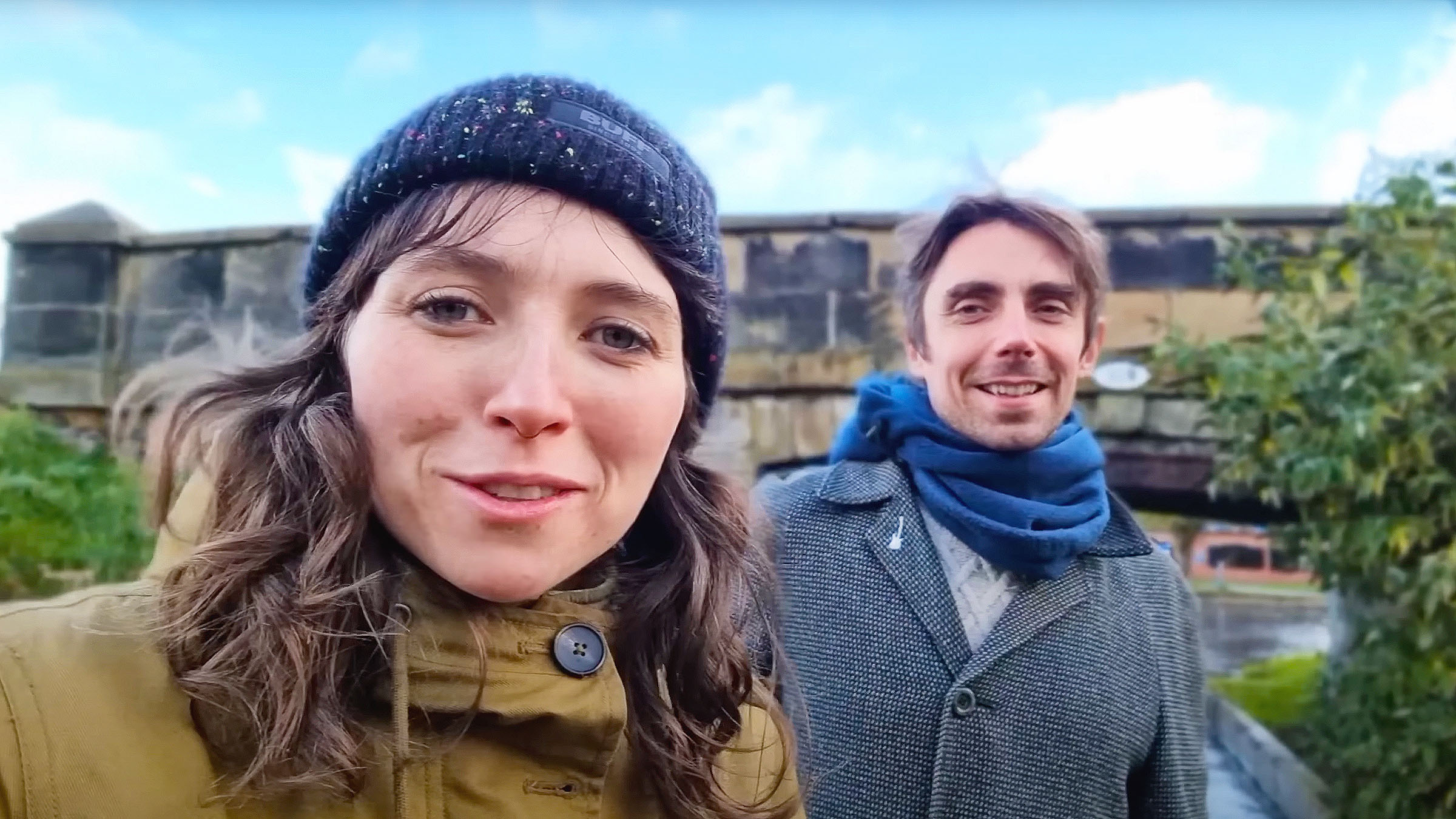


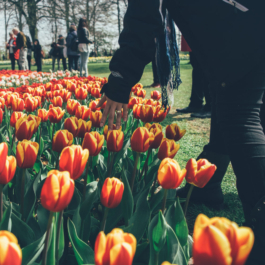
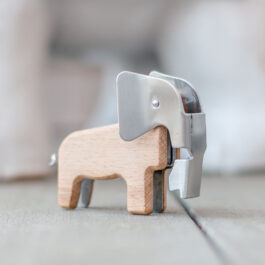
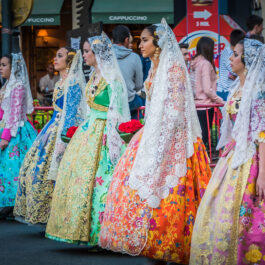


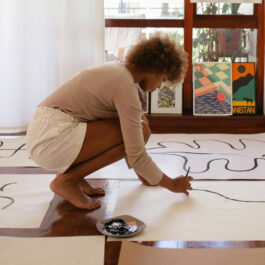

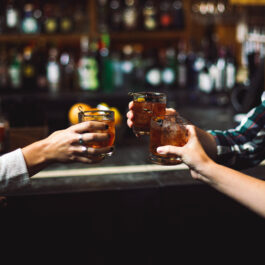


Sorry, the comment form is closed at this time.